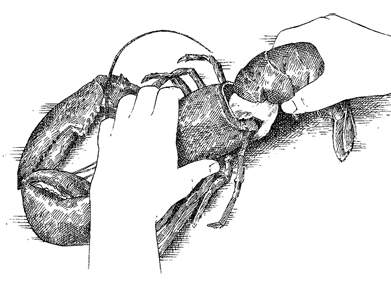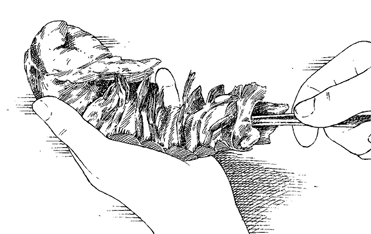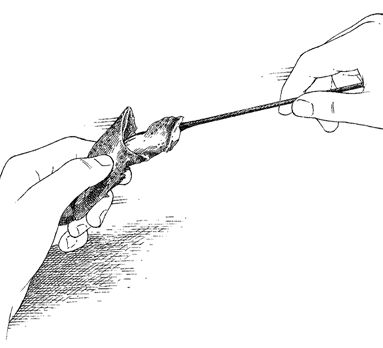The Cook's Illustrated Cookbook (212 page)
Read The Cook's Illustrated Cookbook Online
Authors: The Editors at America's Test Kitchen
Tags: #Cooking

![]() WHY THIS RECIPE WORKS
WHY THIS RECIPE WORKS
Preparing mussels can be an all-day affair, what with scrubbing, debearding, and rinsing. Yet despite all that work, the broth is often gritty and the mussels sometimes taste funky. For steamed mussels that were quick to prepare, flavorful, and grit-free, we began with rope-cultured Great Eastern bottom mussels (a widely available variety), which we found to be the cleanest. Garlic in the broth balanced and enriched the flavor of the mollusks and simmering the cooking liquid with a few flavorful additions (like shallots, garlic, and parsley) for a few minutes before adding the mussels deepened the flavor. We found that larger mussels needed to cook a few minutes after they opened to firm up. It all evened out if we simply cooked them until all the mussels opened.
SERVES 4
To debeard the mussels, simply pull off the weedy black fibers. Serve with crusty bread or rice to soak up the flavorful cooking liquid.
2 | cups white wine |
¹⁄ | cup minced shallots |
4 | garlic cloves, minced |
¹⁄ | cup chopped fresh parsley |
1 | bay leaf |
4 | pounds mussels, scrubbed and debearded |
4 | tablespoons unsalted butter, cut into 4 pieces |
1.
Bring wine, shallots, garlic, parsley, and bay leaf to simmer in Dutch oven and simmer to blend flavors, about 3 minutes. Increase heat to high, add mussels, cover, and cook, stirring twice, until mussels open, 4 to 8 minutes. Discard any unopened mussels.
2.
Remove mussels from liquid and transfer to serving bowl. Whisk in butter, 1 tablespoon at a time. Pour broth over mussels, season with salt and pepper to taste, and serve immediately.
SERVES 4
Serve with crusty bread or rice to soak up the flavorful cooking liquid.
1 | cup low-sodium chicken broth |
2 | teaspoons rice vinegar |
¹⁄ | teaspoon cayenne pepper |
2 | tablespoons grated fresh ginger |
2 | garlic cloves, minced |
4 | scallions, minced |
2 | tablespoons grated lime zest (3 limes) (optional) plus lime wedges |
4 | pounds mussels, scrubbed and debearded |
2 | tablespoons minced fresh chives, cilantro, or scallions |
1.
Bring chicken broth, rice vinegar, cayenne, ginger, garlic, scallions, and lime zest (if using) to simmer in Dutch oven and simmer to blend flavors, about 3 minutes. Increase heat to high, add mussels, cover, and cook, stirring twice, until mussels open, 4 to 8 minutes.
2.
Remove mussels from liquid and transfer to serving bowl. Pour broth over mussels, garnish with chives. Serve immediately with lime wedges.
Serve these tomato-bathed mussels over cappellini or angel hair pasta.
Decrease wine to 1 cup and substitute ¹⁄
2
cup chopped fresh basil for parsley. After removing mussels from broth in step 2, add 2 cups canned crushed tomatoes. Substitute ¹⁄
4
cup olive oil for butter, simmering after adding to pot until reduced to sauce consistency, about 10 minutes. Season with salt and pepper to taste. Return mussels to pot with reduced sauce and gently stir to coat. Serve.
Add 1 teaspoon Madras curry powder to wine mixture in step 1 and reduce parsley to 2 tablespoons. Right before swirling in butter, stir in 2 tablespoons chopped fresh cilantro and 2 tablespoons chopped fresh basil.
![]() WHY THIS RECIPE WORKS
WHY THIS RECIPE WORKS
The secret to tender lobster is not so much in the preparation and cooking as in the selection of the creature itself. After some research into the life cycle of the lobster, we discovered that the variations in the texture of lobster meat depended a great deal on what part of the molting cycle a lobster is in. You will find both hard-shell and soft-shell lobsters available; lobsters are in their prime when their shells are fully hardened. Soft-shell lobsters have claw meat that is shriveled, scrawny, and spongy in texture and tail meat that is underdeveloped. Steaming is far tidier than boiling, as you avoid dealing with waterlogged crustaceans at the dinner table. Neither beer no wine improved the flavor. As for dry heat cooking methods, we found the steady heat of the oven preferable to broiling. And to keep the tail from curling during roasting, we simply ran a skewer through it.
See “APPROXIMATE STEAMING TIMES AND MEAT YIELDS FOR LOBSTER” table that follows recipe.
See “REMOVING MEAT FROM STEAMED LOBSTERS” illustrations that follow recipe.
See “PREPARING A LOBSTER FOR ROASTING” illustrations that follow recipe.
SERVES 4
While we prefer hard-shell lobsters to soft-shell lobsters, soft-shell lobsters are more available in the summer (late spring and early summer is the best time to find hard-shell lobsters). However, because hard-shell lobsters are more packed with meat than soft-shell ones, you may want to buy 1¹⁄
2
- to 1³⁄
4
-pound soft-shell lobsters per person.
4 | live lobsters |
8 | tablespoons butter, melted (optional) |
Lemon wedges |
Fit stockpot or Dutch oven with steamer basket or pasta insert. Add water, keeping level below basket. Bring water to boil. Add lobsters, cover, and return water to boil. Reduce heat to medium-high and steam until lobsters are done, following cooking times in chart
“APPROXIMATE STEAMING TIMES AND MEAT YIELDS FOR LOBSTER”
. Serve immediately with melted butter and lemon wedges.
SERVES 4
Panko, extra-crisp Japanese bread crumbs can be substituted for the dry bread crumbs. You will need four 12-inch metal skewers for this recipe.
4 | live lobsters |
4 | tablespoons butter |
¹⁄ | cup plain dry bread crumbs |
2 | tablespoons minced fresh parsley or 1 tablespoon minced fresh tarragon or snipped chives |
Salt and ground white pepper | |
Lemon wedges |
1.
Line 2 rimmed baking sheets with aluminum foil. Adjust oven rack to upper-middle position and heat oven to 450 degrees.
2. TO PREPARE LOBSTERS:
With chef’s knife facing head, kill each lobster by plunging knife into body where shell forms “T,” then move blade straight through head. Turn lobster over, and cut through body toward tail, making sure not to cut all the way through shell. Holding half of tail in each hand, crack, but do not break, back shell to butterfly lobster. Remove and discard stomach sac, intestinal tract, and green tomalley. Run skewer up 1 side of lobster tail.
3.
Melt 1 tablespoon butter in 8-inch skillet over medium heat. Add bread crumbs and cook, stirring constantly, until toasted and golden brown, 3 to 4 minutes. Stir in herbs and set aside.
4.
Arrange lobsters on prepared baking sheets, alternating tail and claw ends. Melt remaining 3 tablespoons butter and brush over body and tail meat of each lobster and season with salt and white pepper to taste. Sprinkle bread-crumb mixture evenly over body and tail meat of lobsters.
5.
Roast lobsters until tail meat is opaque and bread crumbs are crisp, 12 to 15 minutes. Serve immediately with lemon wedges.
LOBSTER SIZE | COOKING TIME | MEAT YIELD |
1 lb. | ||
Soft-Shell | 8 to 9 min. | about 3 oz. |
Hard-Shell | 10 to 11 min. | 4 to 4¹⁄ |
1¹⁄ | ||
Soft-Shell | 11 to 12 min. | 3¹⁄ |
Hard-Shell | 13 to 14 min. | 5¹⁄ |
1¹⁄ | ||
Soft-Shell | 13 to 14 min. | 5¹⁄ |
Hard-Shell | 15 to 16 min. | 7¹⁄ |
1³⁄ | ||
Soft-Shell | 17 to 18 min. | 6¹⁄ |
Hard-Shell | about 19 min. | 8¹⁄ |

1.
After cooked lobster has cooled slightly, twist tail and claw appendages to remove them from body. Discard body.

2.
Twist tail flippers off tail, then use fork or your finger to push tail meat out through wide end of tail.

3.
Use lobster crackers or mallet to break open claw and remove meat.

4.
Crack open claw appendage’s connecting joint and remove meat with cocktail fork.
